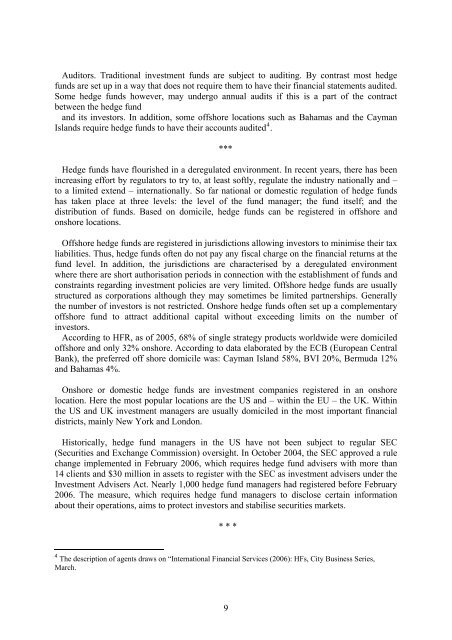Executive summary - Udo Bullmann
Executive summary - Udo Bullmann
Executive summary - Udo Bullmann
- No tags were found...
You also want an ePaper? Increase the reach of your titles
YUMPU automatically turns print PDFs into web optimized ePapers that Google loves.
Auditors. Traditional investment funds are subject to auditing. By contrast most hedgefunds are set up in a way that does not require them to have their financial statements audited.Some hedge funds however, may undergo annual audits if this is a part of the contractbetween the hedge fundand its investors. In addition, some offshore locations such as Bahamas and the CaymanIslands require hedge funds to have their accounts audited 4 .***Hedge funds have flourished in a deregulated environment. In recent years, there has beenincreasing effort by regulators to try to, at least softly, regulate the industry nationally and –to a limited extend – internationally. So far national or domestic regulation of hedge fundshas taken place at three levels: the level of the fund manager; the fund itself; and thedistribution of funds. Based on domicile, hedge funds can be registered in offshore andonshore locations.Offshore hedge funds are registered in jurisdictions allowing investors to minimise their taxliabilities. Thus, hedge funds often do not pay any fiscal charge on the financial returns at thefund level. In addition, the jurisdictions are characterised by a deregulated environmentwhere there are short authorisation periods in connection with the establishment of funds andconstraints regarding investment policies are very limited. Offshore hedge funds are usuallystructured as corporations although they may sometimes be limited partnerships. Generallythe number of investors is not restricted. Onshore hedge funds often set up a complementaryoffshore fund to attract additional capital without exceeding limits on the number ofinvestors.According to HFR, as of 2005, 68% of single strategy products worldwide were domiciledoffshore and only 32% onshore. According to data elaborated by the ECB (European CentralBank), the preferred off shore domicile was: Cayman Island 58%, BVI 20%, Bermuda 12%and Bahamas 4%.Onshore or domestic hedge funds are investment companies registered in an onshorelocation. Here the most popular locations are the US and – within the EU – the UK. Withinthe US and UK investment managers are usually domiciled in the most important financialdistricts, mainly New York and London.Historically, hedge fund managers in the US have not been subject to regular SEC(Securities and Exchange Commission) oversight. In October 2004, the SEC approved a rulechange implemented in February 2006, which requires hedge fund advisers with more than14 clients and $30 million in assets to register with the SEC as investment advisers under theInvestment Advisers Act. Nearly 1,000 hedge fund managers had registered before February2006. The measure, which requires hedge fund managers to disclose certain informationabout their operations, aims to protect investors and stabilise securities markets.* * *4 The description of agents draws on “International Financial Services (2006): HFs, City Business Series,March.9





